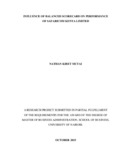| dc.description.abstract | Changing business environments and the advent of technology has forced companies in the information age to rethink ways of measuring, managing and continuously improve their performance. Organization performance has become a phenomenon of interest for scholars and practitioners all over the world. This is mainly because organizations exist in competitive environments and only those that perform well are considered successful and will have a competitive advantage over competition. The balanced scorecard is a framework that was put forth by Robert Kaplan and David Norton in their Harvard Business Review article in 1992. It measures performance in four perspectives namely; financial, customer, internal business processes, and learning and growth. These perspectives add to the traditional measures which only focused on the financial measures by including non-financial measures of performance. It has been used to align business activities to the vision and strategy of the organization, improve internal and external communications, and monitor organizational performance against strategic goals. This study was based on a case study of Safaricom Kenya Limited and was anchored on the Resource Based View and Dynamic Capabilities theories. Safaricom Ltd is a market leader in the Kenyan telecommunications industry. In a study conducted by Karimi (2010), it was noted that Safaricom Ltd used the balanced scorecard for strategy implementation. The objective f the study was to find out the influence the balance scorecard had on performance at the company. Data for the research was collected using an interview guide and a total of twenty three Heads of Departments were interviewed. Content analysis was used to analyze the data collected. Results from the research confirmed that the balanced scorecard has a positive influence on performance at Safaricom Limited. The Heads of Departments confirmed that the information from the balanced scorecard had helped them to improve the financial and operational performance of the organization. The interviewees also confirmed that the balanced scorecard had been instrumental in communicating the vision, mission and strategy of the company to its employees thereby creating synergy and collected effort towards achieving the overall goals of the company and creating a balance between the short-term and long-term objectives of the company. Results from the research will assist in adding to the theory, practice and policy by providing insights on the influence of the balanced scorecard on performance. | en_US |

